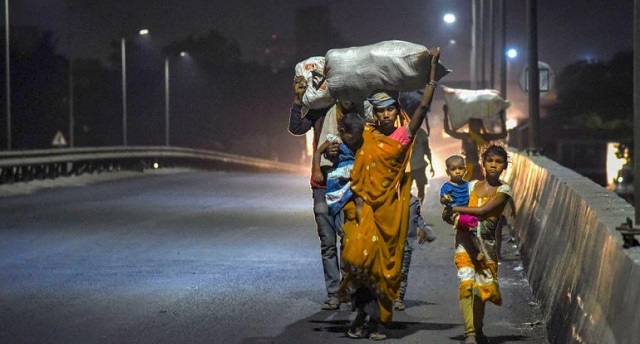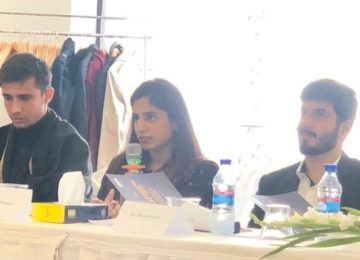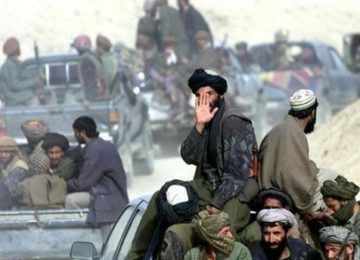May 12, 2020
With no food or money left, thousands of migrant workers across India have left for their homes on foot. India Today travelled with groups of migrants along the Jaipur-Ajmer highway, as they continued their long marches to their home states. They say it is better to die on their way back home than to die of hunger or no food.
Thousands of migrant workers have set off on foot, cycles to their native towns — covering hundreds of kilometres through the highways in the scorching heat — with their family.
Rendered jobless due to the lockdown, migrants, including women and children, walking in the sun with their all belongings in a bag on the highways, have become defining images of the lockdown in India. Despite governments assuring them food and shelter, these anxious citizens continue the tough journey back home as they walk day and night to far away states of Uttar Pradesh, Bihar, Jharkhand Chhattisgarh and Jammu and Kashmir.
Neither this journey nor the situation is ordinary.
India Today tracked groups of migrants along the Jaipur-Ajmer highway, as they continued their long marches in a desperate bid to return safe confines of their home.
The correspondent travelled with these migrant labourers to take a look at what life is on the highway right now.
(Jaipur to Ajmer)
It takes around three hours to travel from Jaipur to Ajmer in a car with air conditioner saving you from the boiling heat of Rajasthan in the month of May.
At present, on the roads are thousands who don’t have the means to cover the same journey in three hours or afford a transportation facility with services of an air conditioner. And so, they have set off on foot to their destinations some even without footwear.
The correspondent’s journey started at 7.30 pm from Jaipur for Ajmer.
Time: 8 pm
Location: 35 km from Jaipur towards Ajmer
The sun has set. A group of migrant labourers can be seen walking along the highway. The workers from Uttar Pradesh and Bihar walk back to their villages with belongings with them. Swollen feet, minor injuries, a broken water gallon and some ration, this is all that is left with them in the name of asset. After walking for four hours, they decide to take a break. They station themselves just along the national highway even as speeding trucks continue to move.
Ramkumar, a labourer, says he used to earn Rs 300 per day. “There is no work, no income, contractor also ran away. How do we survive? It’s better to die on our way back home than die of hunger with no work.”
Hamirpur resident Munna Lal, part of the same group, has been walking for been six days. He says it may take another 12 days to reach his home. “Our employer could have sent us back home. We even paid Rs 35,000 at Rajsamand. We were even tested, but told to run away.”
Ram Khelavan was in Udaipur since last three years. He worked at construction sites with daily earning of Rs 350. He says he decided to return to his village in Bhabhua district of Bihar after survival became a challenge post lockdown.
“Our contractor escaped and my family is in the village. We will see if we will live or die but we will go back. We are walking day and night. If someone provides food on the road, we eat. But sometimes we don’t have food and survive only on biscuits,” he says.
When they are tired, they sleep along the national highway despite the risk of speeding trucks.
On why he didn’t take a train back home, Ram Khelawan says he spent four days to get registered for transportation but nothing happened.
Nandlal, who was working in the marble industry, says he has been walking for 10 days.
“I am left with Rs 100. Contractor betrayed us and ran away. No ration was provided, and he told us to go. We were stopped but later asked to run away. No one helped us.”
Many tell India Today that they will come back once lockdown is lifted. “We won’t come back by choice but we don’t have any choice either. We will not wish to come back but family situation is bad and that will bring us back here,” says Raju.
Time: 9.30 pm
Rest is over, night is long. At 9.30 pm, migrant workers are walking again.
Time: 11 pm
Location: 70 km from Jaipur
Rama, Ramesh and Pawan walk with bags with all that is left with them. Walking from Jodhpur, they are on their way to Gorakhpur in Uttar Pradesh.
All of them used to earn Rs 400-500 per day by painting and polishing in Jodhpur, they say.
“We had no ration for I don’t know how many days. Sometimes we used to get two rotis, sometimes four and many times not even one. We asked our families in Gorakhpur to send money and that helped us to survive,” says Ramesh.
Ramesh says 20 labourers with them started with cycling. “There was no shop open which could repair cycles along the highway so we threw cycles on the road and started walking.”
Rama adds, “No one helped us. Whenever we approached a dhaba, they asked us to go.”
There say there were, however, some people who came to their rescue as they offered them food, water, biscuits and food. “For last one month, labourers have been walking or cycling. We provide them water, biscuit or let them use washroom if they ask. They are in a bad condition,” says Vishnu, a dhaba owner on the Jaipur-Ajmer highway.
Time: Midnight
The group continues with their journey towards Gorakhpur while India Today’s crew moves towards Ajmer.
Along the highway is another group of migrants from Jammu and Kashmir.
Time: 1 am
Some are lying on the ground, some just standing and others talking to each other, this group of migrants from Jammu are walking all the way from Ahmedabad. They show what walking for days has done to their feet.
Mahendra Kumar, one of the 20 migrants, says he used to work in Ahmedabad. “We were left with no cash. There was no dry ration available. We started walking, police stopped us time and again, but no one helped.”
From Kathua district, Ganesh also worked in Ahmedabad in a transport company. “There was no work, whatever money we had, we spent, we followed all rules under lockdown, we kept waiting for the government to ensure our return but no government helped us. Since we had no ration to survive, we started walking,” Ganesh says.
“There are still more than 300 stranded labours. They have no ration no food, neither any medical facilities nor chances of social distancing as multiple people live in one room. There was no other way out.”
Time: 3 am
Migrants sleeping along the highway wake up to share their stories. Vittaldas tells India Today how he survive post lockdown period.
Time: 4 am
At 4 am, it was time to take a nap. The road was too hot as temperature during day goes up to 43 degree Celsuis in Rajasthan.
It was next to impossible to sleep on the floor with just a piece of cloth to shield the body.
The tough journey back home is not only risky but immensely painful.
Source: India Today.








